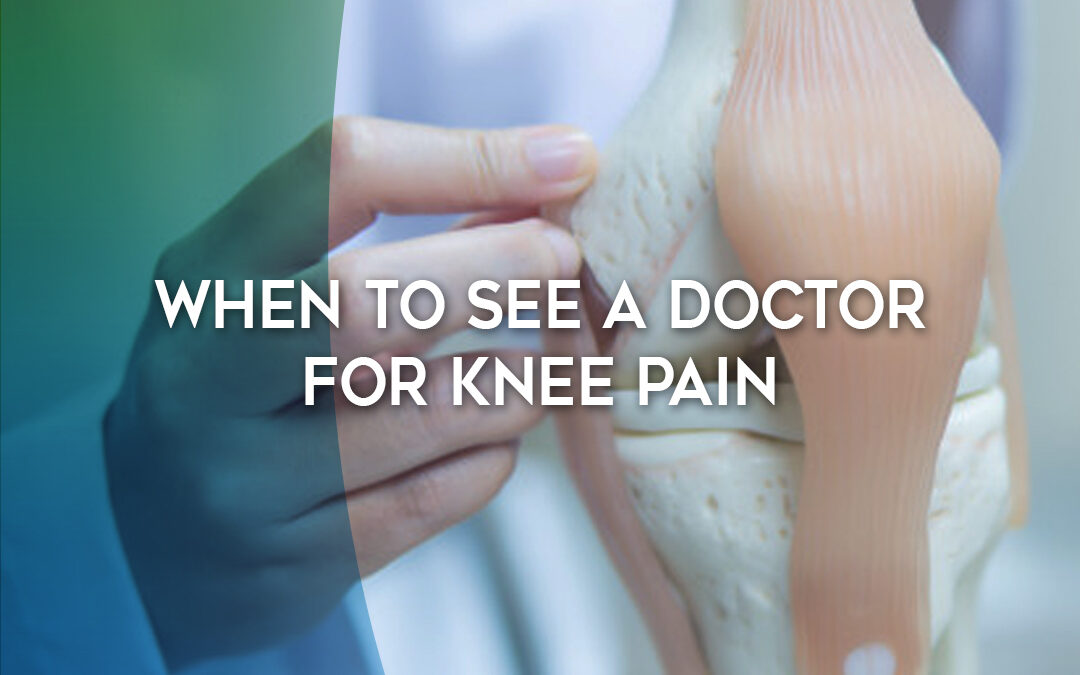Anyone can develop knee pain — and chances are, you’ll end up dealing with a painful knee at some point in your life. There are many causes behind knee injuries and conditions, including tendon and ligament tears, cartilage injuries, inflammation, dislocations, fractures, overuse injuries, and arthritis.
In many cases, acute knee pain will heal on its own within a few days. But what if it doesn’t? Below, we break down the signs that indicate it’s time to see an experienced knee doctor to evaluate and treat your pain.
6 Signs That Mean It’s Time to Call Your Doctor
The following symptoms are warning signals of a knee injury or condition that requires medical attention and treatment.
1. Long-lasting pain. Most knee pain resolves on its own within a few days with the help of self-care measures. But persistent pain that lingers or comes and goes for several weeks or months is a sign of an underlying condition that requires medical attention.
2. Difficulty performing daily tasks. If knee pain is affecting your daily life, it’s time to see a doctor. Pain that causes difficulty walking or climbing stairs, running errands, exercising, or performing other daily tasks should be evaluated by a professional. You should also see a knee doctor if pain is affecting your ability to sleep, concentrate at work, or enjoy social outings with friends and family.
3. Loss of range of motion. Make an appointment with your provider if pain and stiffness cause difficulty fully bending or straightening the knee, or moving the knee joint through its full range of motion.
4. Instability. If you experience weakness, locking, wobbliness, or a “giving out” feeling when placing weight on a painful knee, see your doctor as soon as possible. Joint instability is a warning sign of a ligament problem that will continue to worsen without medical care.
5. Redness, swelling and warmth. If pain is accompanied by redness, swelling, tenderness and warmth, make an appointment with your doctor. These symptoms could indicate a knee infection.
6. Visible deformity. Contact a knee doctor if one knee looks visibly deformed compared to the other knee.
If you’re having a knee emergency, don’t wait to make a doctor’s appointment — call 911 or go to the ER if you have severe knee pain accompanied by a popping noise, an inability to bear weight on the knee, an inability to move the knee joint, sudden and significant swelling, numbness in the lower leg or foot, or a visible deformity.
How Is Knee Pain Treated?
Treatment varies depending on your injury or condition. Your doctor might prescribe medications, assistive devices like orthotics, injections, and physical therapy as part of a non-surgical treatment plan. If you have a chronic condition like knee arthritis, weight management and regular exercise can help reduce pain and strengthen the knee joint.
Sometimes, surgical repair is necessary to resolve knee pain. Many ligament tears and cartilage injuries can be treated with a minimally invasive procedure called arthroscopy. If you have significant joint damage from arthritis, your doctor might recommend a partial or total knee replacement surgery to reduce pain and restore functional mobility.
If your doctor recommends total knee replacement, find out if you’re a candidate for the iO-Core™ procedure before making a decision. The iO-Core™ procedure is a minimally invasive surgery that uses a combination of orthopedics and biologics to treat the root cause of joint pain.
Today, we know that arthritis affects more than a joint’s surface cartilage — as the disease progresses, arthritis causes damage to the underlying bone, joint lining, and connective tissues. The iO-Core™ procedure targets surface cartilage loss and underlying bone damage to treat the joint as a whole. The procedure not only reduces pain and restores joint function, but it prevents further joint damage. Many patients experience pain relief within one week after undergoing surgery.
Contact Us Today to Find Out If You’re a Candidate
Many people who were told they needed a total joint replacement surgery have found long-term pain relief and greater mobility from iO-Core™ instead. Contact our team today to learn more and see if you qualify.

